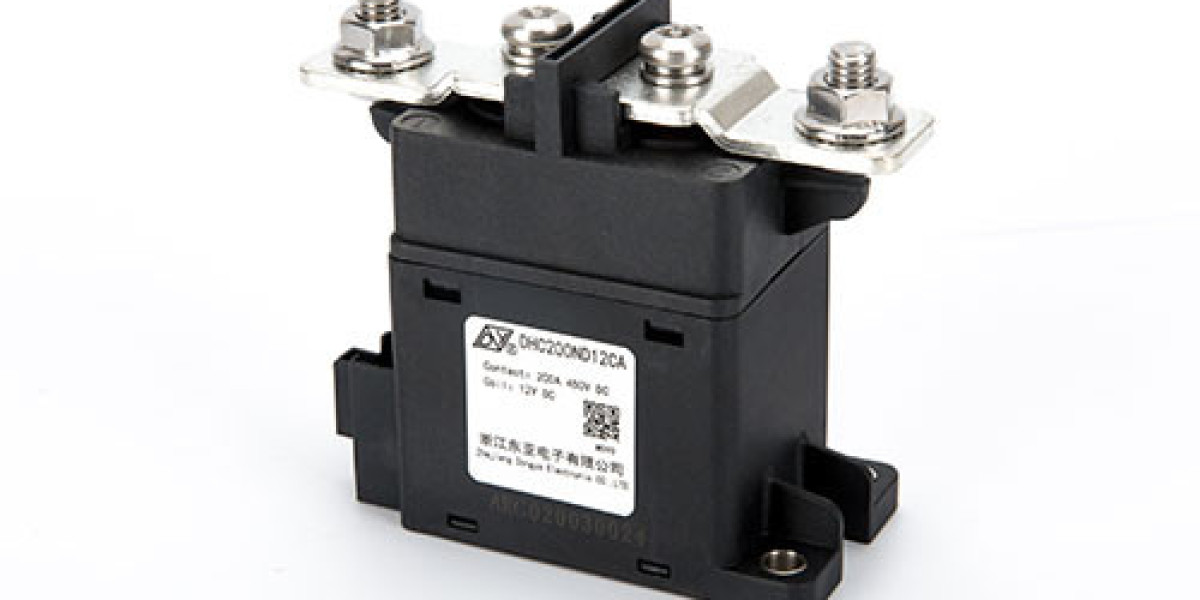The DC contactor market is experiencing significant growth due to its pivotal role in various industries, including automotive, renewable energy, and industrial automation. DC contactors are essential components in electrical systems, primarily used for controlling the flow of DC electricity to various applications. As the demand for renewable energy sources and electric vehicles continues to rise, the DC contactor market is poised to expand further. The increasing adoption of renewable energy technologies, coupled with the growing need for energy-efficient solutions, is fueling the demand for high-performance DC contactors worldwide.
What is a DC Contactor?
A DC contactor is an electrically-controlled switch that is used to connect or disconnect a DC circuit. It works by controlling the flow of current in a circuit when the coil of the contactor is energized. DC contactors are often used in high-power applications, including electric vehicles, battery management systems, solar power systems, and other industrial machinery that require direct current operation.
DC contactors differ from AC contactors in the way they handle electrical arcs when the contacts open or close. Because DC circuits do not naturally extinguish arcs as AC circuits do, DC contactors are designed with specialized components to safely manage and interrupt the current flow without causing electrical arcing.
Key Drivers of DC Contactor Market Growth
1. Surge in Electric Vehicle Adoption
One of the primary drivers of the DC contactor market's growth is the increasing adoption of electric vehicles (EVs). As global automotive manufacturers shift toward electric mobility, the demand for DC contactors to manage high-voltage battery systems in electric vehicles has risen sharply. These contactors are essential for ensuring safe and efficient energy transfer between the vehicle's battery and its electric motor.
2. Expansion of Renewable Energy Systems
With a growing focus on sustainability, there is a significant rise in the installation of renewable energy systems such as solar and wind power. DC contactors play a vital role in these systems by controlling the flow of electricity between the power generation unit, storage batteries, and the grid. As solar and wind energy adoption accelerates globally, the need for reliable and durable DC contactors is expected to increase substantially.
3. Industrial Automation and Energy Efficiency
As industries continue to adopt automated solutions for production lines and machinery, the demand for reliable and energy-efficient DC contactors also grows. These components are used to control motors, batteries, and other systems that operate on DC power. Industrial automation and the growing trend toward energy-efficient technologies are expected to contribute significantly to the expansion of the DC contactor market.
Types of DC Contactors
DC contactors are available in various configurations, depending on the specific application. The main types include:
1. Standard DC Contactors
These are commonly used in low- to medium-voltage applications, such as in industrial machinery, renewable energy systems, and backup power systems. Standard DC contactors are designed to handle moderate current loads and offer reliable operation under normal conditions.
2. High Voltage DC Contactors
These are specifically designed for high-voltage applications, such as electric vehicles and grid-scale energy storage systems. High-voltage DC contactors are engineered to manage greater electrical loads and are built to withstand higher levels of stress and potential arcing.
3. Low-Voltage DC Contactors
Low-voltage DC contactors are typically used in circuits with lower current and voltage ratings. These contactors are designed for applications like battery management systems, telecom equipment, and low-power industrial systems.
Regional Insights: DC Contactor Market by Region
North America
North America is one of the largest markets for DC contactors, driven by the rapid expansion of electric vehicle adoption, renewable energy projects, and automation in industries. The region is home to many leading manufacturers of DC contactors, and the demand for these components is expected to remain strong as more electric vehicle models enter the market.
Europe
Europe is another key market for DC contactors, primarily due to stringent environmental regulations that promote the use of renewable energy sources. European nations, including Germany and France, are heavily investing in solar, wind, and electric vehicle infrastructure, thereby boosting the demand for high-performance DC contactors.
Asia Pacific
The Asia Pacific region is expected to witness the highest growth in the DC contactor market. Countries like China, Japan, and India are at the forefront of both renewable energy deployment and electric vehicle production. China, in particular, is rapidly scaling up its electric vehicle industry, driving significant demand for DC contactors to manage the high-power needs of these vehicles.
Challenges in the DC Contactor Market
Despite the growth potential, the DC contactor market faces certain challenges that could impact its expansion:
1. High Manufacturing Costs
DC contactors, especially those designed for high-voltage applications, can be expensive to manufacture. The use of specialized materials and technologies to prevent electrical arcing in DC circuits can increase production costs, making it a challenge for manufacturers to offer affordable products.
2. Competition from Solid-State Relays
Solid-state relays (SSRs), which are electronic switches without moving parts, present competition to traditional mechanical DC contactors. SSRs are gaining traction in various applications due to their ability to provide faster switching and lower maintenance requirements.
3. Technological Advancements and Standardization
As the industry continues to innovate, the development of new technologies and standards for DC contactors is crucial for ensuring their compatibility with emerging applications, such as high-voltage energy storage systems and next-generation electric vehicles. Keeping up with these technological advancements can be a challenge for manufacturers in the DC contactor market.
Future Outlook of the DC Contactor Market
The future of the DC contactor market looks promising, with several factors contributing to its growth:
Increasing demand for electric vehicles will continue to drive the need for high-quality DC contactors capable of managing high-voltage systems.
Renewable energy installations, particularly solar power and energy storage systems, will fuel demand for reliable DC contactors that can handle variable power sources.
Advances in technology will improve the efficiency, durability, and safety of DC contactors, making them more attractive for a variety of industrial and commercial applications.
In conclusion, the DC contactor market is set to experience significant growth in the coming years, driven by the adoption of electric vehicles, renewable energy systems, and industrial automation. With technological innovations and an increasing focus on energy efficiency, the market is well-positioned to meet the evolving needs of various industries.
More Trending Reports








